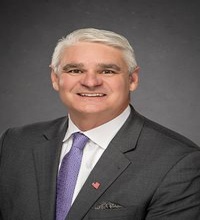(KAIR)--A Kansas Senator supportive of internet expansion in the state worked to remedy a setback for one such effort: past laws preventing black Americans from purchasing property.
A release from the office of Kansas Republican Craig Bowser, of Holton, says the matter came to light when Bowser's son, in December, 2024, told the Senator Wichita State University, where he's a student, was set to gain the first internet exchange point in Kansas, which the release explains is a physical location where different networks come together to exchange Internet traffic, allowing for more efficient data transfer between networks, reducing latency and improving overall Internet performance.
Bowser, who the release says "was thrilled to learn of the IXP as he knew it would benefit all Kansans," sits on the Kansas Senate Committee of State and Local Governments. In February of this year, WSU and the IXP developer, Connected Nation, approached that committee, explaining that the 1.3 acre property purchased by the university in the 1950's, and planned as the location for the IXP, had a racial covenant attached to it, a common practice in the 1940- and 1950- as a way to keep people of color, especially black Americans, out of white neighborhoods by preventing them from purchasing property.
After WSU and the developer requested that the law be changed, Bowser, the release says, "then led the charge," carrying the Senate bill, which is now law, onto the Senate floor, statutorily aligning court rulings on the prohibition of racially restrictive covenants.
Bowser, in the release, says he "was honored to help pass this important piece of legislation which will eliminate racial covenants in [Kansas] and promote healthy communities," while also helping "economic development by improving the entire regional broadband landscape and prepare Kansas for the future.”
On May 15th, WSU and Connected Nation held a groundbreaking ceremony for the state's first IXP and the elimination of racial covenants in Kansas.
The nearly $50 million project is expected to be completed in 2026.
© Many Signals Communications
MOST VIEWED STORIES
Three injured in Brown County rollover crash
Rural Horton man sentenced to prison
Dump truck driver hospitalized after Jackson Co crash
Highland search warrant leads to arrest, alleged stolen property, drugs
Two charged in Doniphan Co storage unit break-ins
Suspicious death in Holt County MO under investigation
Biking Across Kansas to make local stops
MO man convicted in Brown Co breach of privacy case
Atchison pursuit ends with VF man in custody
Seneca City Council approves purchase of robot
Jury trial set for Atchison man charged in Brown Co burglaries
Two arrested after early morning Jackson Co traffic stop
Commission approves engineering agreement for housing development
Atchison's Patriot Street bridge set for replacement
Senator Moran visits two local hospitals
Rates going up at Nemaha Co landfill
Committee formed for Atchison Co Lake's future
3 nominated for KS Supreme Court vacancy
LATEST STORIES
Leadership Nebraska announces new class
RCSD Special Enforcement results
Evergy rate request reaches final public hearing Monday
Health advisory issued for additional local lake
Effingham cleared of boil water advisory
Jury trial set for Atchison man charged in Brown Co burglaries
USD 415 board leadership to remain same


 Printer Friendly
Printer Friendly
 Email to a Friend
Email to a Friend






